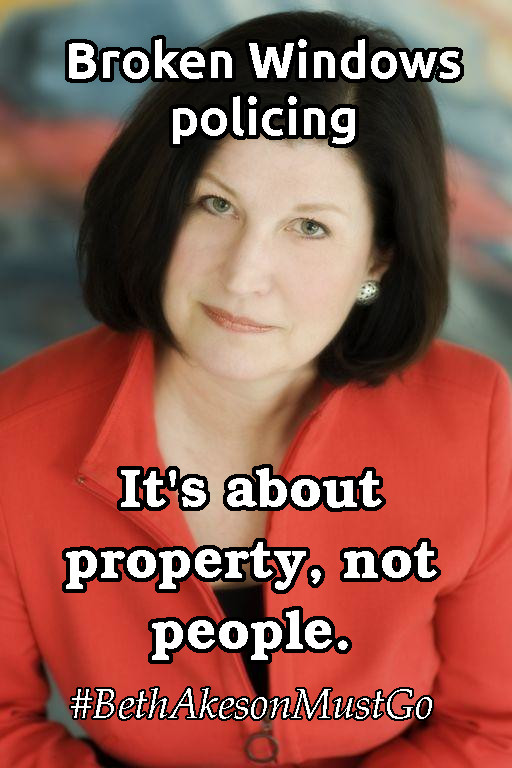At-Large City Councilperson Beth Akeson (who is running for reelection to Peoria City Council) has a problem, a problem specifically with Broken Windows. At a recent forum, she was asked if she still supports “Broken Windows” policing (also referred to as zero-tolerance policing or quality-of-life policing) even though it relies on controversial & draconian forms of police interactions, like “Stop & Frisk”, and is enforced disproportionately upon communities of color. In her response she stated, “Broken Windows Theory has nothing to do with ‘Stop & Frisk’. Broken Windows Theory has to do with when blight expands & moves throughout a community like a cancer; it creates the conditions that say…the people that live in those neighborhoods are not valuable or not worthy; they don’t deserve to live in a nicer place.” In private, she stated to me that Broken Windows focused on property, not people.
According to internationally renowned sociologist & ethnologist Loïc Wacquant, broken windows policing “postulates that the immediate & stern repression of the slightest… nuisance on the streets stems the onset of major criminal offenses by (re)establishing a healthy climate of order.” Reasserting order with a draconian zeal will stem major crimes. (Punishing the Poor 264) It focuses primarily on minor offenses: jaywalking, littering, panhandling, loitering, playing music too loud, ordinance violations, open alcohol containers, etc. And, one of the key tactics of the NYPD was Stop & Frisk.
The problem with Broken Windows policing is it rests on a fallacy that there is a real causal link between a neighborhood’s visible indicators of “disorder” and its crime rates. Data going back 3 decades shows no such link exists. However, this false belief allows the proponents of this theory to ignore the very real issues of poverty and racial segregation, in favor of the vague notion of culture. If the blame for crime is placed precisely on the oppressed communities shoulders, and not systemic inequalities like poverty and racism, then it should come as little surprise that the enforcement of Broken Windows Theory rests largely on communities of color.
The problem for Councilperson Akeson is this ignorance of systemic issues permeates her entire career as a public servant. In a recent video interview with the PJStar she was asked a question about the causes of intense racial segregation in Peoria. She answers the question by blaming building codes, but no where does she even mention systemic racism or other forms of inequality. It is as if they don’t exist in her world-view. And, this is what we’ve learned to expect from the person who decried the “ill-equiped” having children and blamed the causes of food deserts on poor people’s eating habits. Again and again, she relies on the vague concept culture to answer problems despite having no data to support this. Peorians deserve better than Beth Akeson.
This article was originally published on Strangecornersofthought.com.


























